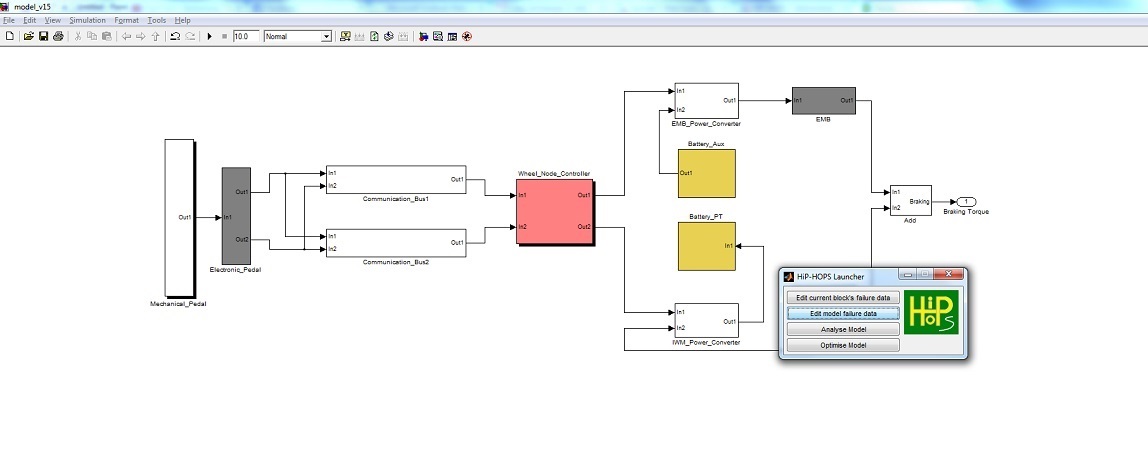-
[Read More]The Dependable and Intelligent Systems Research Group at the University of Hull is presently pioneering the development of novel methods and tools for dependability analysis and optimisation of complex safety critical engineering systems collectively known as Hierarchically Performed Hazard Origin and Propagation Studies (HiP-HOPS).

Important contributions of HiP-HOPS to the field of dependability so far include:
- Novel algorithms for top-down semi-automatic allocation of safety requirements in the form of Safety Integrity Levels - this work automates some of the processes for ASIL allocation specified in the new automotive safety standard ISO26262
- Fast algorithms for bottom up dependability analysis via automatic synthesis of Fault Trees and Failure Models and Effects Analyses (FMEAs) where the basis of the analysis can be provided by architectural models that can be hierarchical described in a single perspective or in multiple perspectives (e.g. HW and SW linked with allocations)
- Linguistic concepts for representation and reuse of component failure patterns
- PANDORA - a new temporal logic that enables assessment of the effects of sequences of faults in Fault Tree Analysis (FTA)
- A novel extension of dependability analyses with genetic algorithms that solves difficult multi-objective optimisation problems in the design of architecture and maintenance of safety critical systems.
HiP-HOPS supports with state-of-the-art model-based techniques, as well as application of search meta-heuristics and sophisticated model-based analysis algorithms both sides of the V engineering lifecycle of a complex system, both the refinement of dependable designs from requirements to detailed SW-HW architecture, and the bottom up verification of dependability. This work has achieved substantial international recognition - more than 100 papers have been published or presented on topics related to this work. In the context of a string of recent European projects (ATESST, ATESST2, MAENAD, DEIS), HiP-HOPS has contributed to the specification of the error modelling capabilities of EAST-ADL, an emerging architecture description language developed as an industry standard for the design of vehicle control systems. HiP-HOPS today is widely recognised as one of the state-of-the-art techniques in the area of dependability analysis.
Following years of research, the HiP-HOPS software tool was commercially launched in 2012. ITI GmbH, a CAE software house and author of the simulation tool SimulationX have integrated HiP-HOPS into SimulationX and provide licences to interested parties. iti-loMore information about this product can be here or by clicking on the ITI logo on the right. The commercial version currently supports combinatorial FMEA & FTA synthesis and analysis and has some design optimisation capability that can help with decisions on component and subsystem selection among alternatives as well as decisions on the level and location of replicated components. The commercial version has experimental support of allocation of requirements in the form of Safety Integrity Levels, a capability that is maturing and scaling up.
HiP-HOPS is an open tool. Licences of the tool for research and easy connection to other modelling tools and modelling frameworks can also be directly bought from the University of Hull (please contact Prof. Yiannis Papadopoulos for access to this version). Experimental connections of HiP-HOPS to modelling languages such as AADL and SySML have been achieved in numerous European and other research projects.
Version Update 2.5.876
[fix] Corrected Minor Asil decompostion usability issue.
[Read More]Version Update 2.5.873
[feature] Updated ASIL parameters to include number of output solutions and a cost heuristic.
[Read More]Version Update 2.5.874
[fix] Updated to ensure backwards compatibility with Windows XP.
[Read More]Version Update 2.5.872
[Fix] HiP-HOPS now gracefully handles running out of memory rather than crashing.
[Read More]Version Update 2.5.870
[Fix] Excessive numbers of warnings no longer cause an out of memory crash. Warning numbers capped at 100 whilst still recording the total number of errors.
[Fix] Incorrect parser error causing crash.
Version Update 2.5.871
[Fix] Bug in Matlab Failure Editor that allowed component data to be overwritten with other component data.
[Fix] Bug in Matlab Failure Editor that occurred when users switched from a perspective to a component.
Version Update 2.5.869
[fix] Updated to ensure IE 11 compatibility.
[Read More]Version Update 2.5.867
[Fix] Updated to support results viewing in IE10.
[Fix] Updated output format to show optimisation output in a consistent style to the other analysis results.
[Fix] Updated output to allow going back to the list of optimisation results from a specific candidate.
Version Update 2.5.862
[Fix] Added missing xsl files in FTOutput folder.
[Read More]